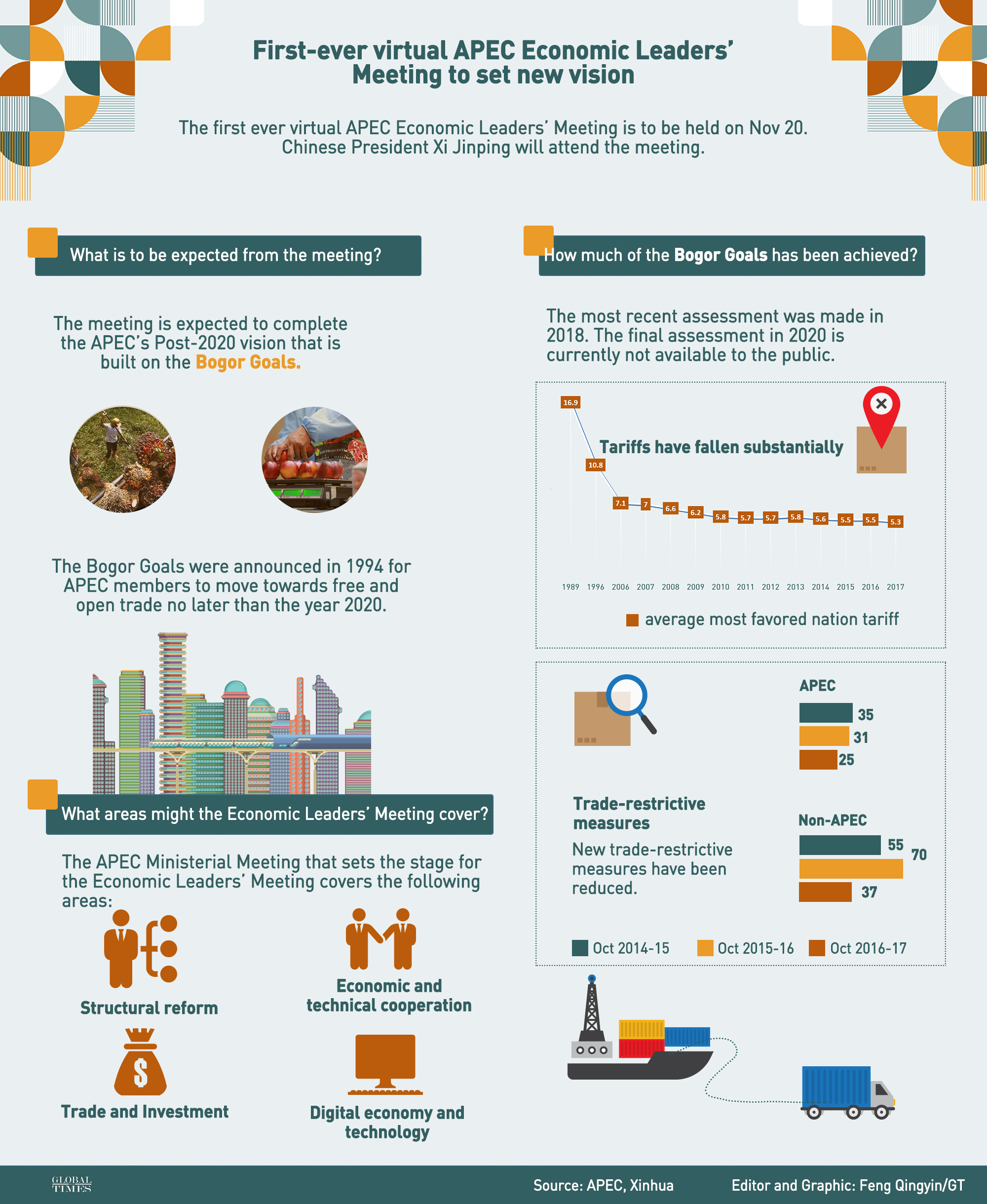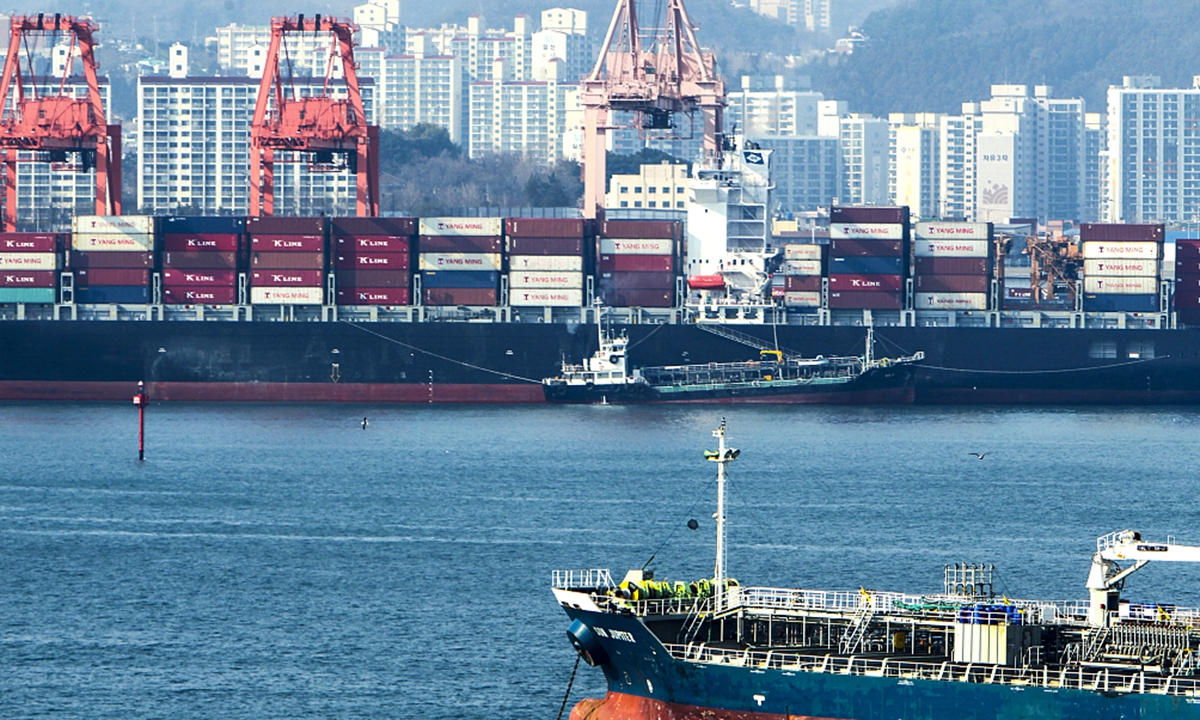RCEP ushers in a key period for global free trade
By Wang Cong Source: Global Times Published: 2020/11/18 19:55:54
Upcoming summits to focus on regional, international cooperation

Photo: VCG
In stark contrast to the chaotic scenes of countries resorting to self-isolation and finger-pointing at the start of the COVID-19 outbreak earlier this year, major economies in the Asia-Pacific and around the world face a critical window of opportunity to cap this year of profound hardship by reaching much-needed breakthroughs in regional and global cooperation on trade and investment.Following the signing of the largest trade agreement by 15 Asia-Pacific countries, global attention will likely focus on further clues as to how the broader Asia-Pacific community plans to build on the recent momentum to promote regional cooperation at the upcoming Asia-Pacific Economic Cooperation (APEC) leaders' summit. Also in focus is a potential breakthrough in the ongoing negotiations for several other free trade and investment deals, including the China-EU bilateral investment treaty (BIT).
Although the Regional Comprehensive Economic Partnership (RCEP) offered fresh momentum for regional and global cooperation in trade and investment, there remain many uncertainties, as the US, which usually plays a major role on such global occasions but has become rather a disruptive force, is in the middle of a chaotic power transition with unclear policy stances, experts noted. As the US wanes, China, which has spearheaded many regional and global cooperation initiatives, will play a central role in further promote cooperation, the experts said.

Infographic:GT
Focus on APEC
On Friday, Malaysia will host a virtual APEC leaders' summit, where joint efforts to combat the COVID-19 pandemic as well as regional economic cooperation will be high on the agenda.
In particular, discussions will focus on the potential outcome of the region's Post-2020 Vision, a key policy document that will determine the role of the APEC platform as well as paths for cooperation in the coming years. There are still many differences among member economies over the content of that document, according to officials and experts.
Consisting of 21 economies in the region, APEC has been a major platform for regional cooperation. However, in recent years, as the US, under the Trump administration has turned inward to pursue a unilateral and protectionist approach, the meeting has been struggling to produce concrete outcomes in recent years. In 2018, due to the US' disruption, the summit failed to adopt a final declaration. Last year's summit, which was scheduled to take place in Chile, was canceled due to social unrest in the country.
Coming on the heels of the signing of the RCEP, analysts expect there could be some positive signals about strengthening regional cooperation, if not breakthroughs, as the US, facing a series of crises, including a raging COVID-19 wave and a chaotic power transition, is likely to play a diminished role this year. It is unclear whether US President Donald Trump will attend the summit.
In stark contrast to the uncertainty over Washington's moves, China has confirmed that President Xi Jinping will attend the leader's summit on Friday after delivering remarks at a business leaders' dialogue on Thursday morning, where he is expected to reiterate China's support for multilateralism and regional and global cooperation as well as China's commitment to continue opening up its market.
"China and the other RCEP member countries have sent a clear signal that the region is open for cooperation in trade and investment… that message of confidence is likely to be highlighted at the APEC summit," Li Yong, deputy chairman of the Expert Committee of the China Association of International Trade, told the Global Times on Wednesday, adding that different from the previous two years, this year the leaders might be able to reach a consensus to strike a more positive tone on cooperation.
In another positive sign, a recent ministerial meeting of APEC economies agreed to jointly fight the COVID-19 pandemic, remove barriers to regional trade and keep borders open for the movement of people, CNN Philippines reported on Tuesday, adding that it was the first time the bloc had reached a consensus since 2017.

Photo:VCG
Breakthroughs
While it remains to be seen whether the APEC leaders' summit can produce concrete plans to further strengthen cooperation, expectations are running high for breakthroughs in negotiations for several other major trade and investment agreements, following the signing of the RCEP.
Among the most closely watched is the sweeping investment deal between China and the EU. Both sides have vowed that they would aim to complete the BIT by the end of this year, but there is no clear timetable yet. Businesses and experts say that the RCEP might help inject some momentum into the ongoing talks.
"The signing of the [RCEP] has offered the latest exciting example of international cooperation that has encountered a tide of protectionism and unilateralism… as China and the EU are making final efforts to complete the talks for the BIT by the end of the year, the China Chamber of Commerce to the EU is looking forward to the official signing of this deal," Zhou Lihong, president of the chamber, said in a statement shortly after the RCEP was signed.
While both China and the EU have shown great commitment to completing the deal, there are still obstacles for the negotiations, as the EU sides are demanding more market access and weighing on the political power transition in the US, according to Cui Hongjian, director of the Department of European Studies of the China Institute of International Studies.
While the RCEP and the BIT are different, the signing of the former "definitely" will have some impact on the process of the negotiations of the latter, as the two sides are likely seek to build on the momentum of the RCEP and overcome obstacles, Cui told the Global Times on Wednesday.
The European Chamber of Commerce in China also said in a statement sent to the Global Times that while the signing of the RCEP will not "have any bearing" on the BIT negotiations, "it shows that China does have an appetite to create more favorable trade conditions with its partners."
Beyond the China-EU BIT, many are also watching closely several other trade agreements under negotiations, including a trilateral free trade deal between China, South Korea and Japan. Unlike the BIT, negotiations for the China-South Korea-Japan trade deal could directly benefit from the signing of the RCEP, as all three are members to the deal and could further build of the RCEP, experts noted.
There could also be more free trade and investment agreements between European and Asia-Pacific economies, as there is a natural integration of Asia and Europe as the world's center of gravity in trade is shifting east, according to Angelo Giuliano, a Hong Kong-based financial consultant from Switzerland.
"I believe that the US will try to undermine any attempt of further Eurasian integration… but Eurasian integration is just a matter of time," Giuliano told the Global Times on Wednesday, adding that US allies will be able to gradually have a more pragmatic and neutral approach in dealing with China as the US will gradually lose its dominance in global trade and dollar hegemony.